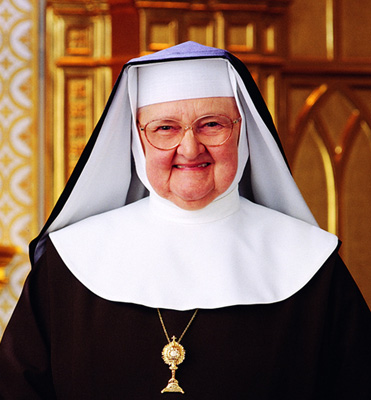
BIRMINGHAM, Ala. (CNS) – Mother Angelica, who founded the Eternal Word Television Network (EWTN) and turned it into one of the world’s largest religious media operations, died March 27 at age 92.
Feisty and outspoken, she was a major controversial figure in the U.S. church in the closing decades of the 20th century. At the same time, the international scope of EWTN’s media operations gave her a ready calling card at the Vatican. She built the venture into a network that transmits programs 24 hours a day to more than 230 million homes in 144 countries via cable and other technologies. It broadcasts in English and several other languages.
Mother Angelica had been ill for years. She was operated on Dec. 24, 2001, in a Birmingham hospital to remove a blood clot in her brain after suffering her second major stroke. It left her with partial paralysis and a speech impediment.
In 2009, Pope Benedict XVI awarded the Pro Ecclesia et Pontifice Cross to her and Deacon Bill Steltemeier, then-chairman of EWTN’s board of governors, for distinguished service to the church. The cross, whose name is Latin for “for the church and the pope,” is the highest papal honor that can be conferred on laypeople and clergy.
Vanguard of the New Evangelization
Because of ill health, Mother Angelica received the award in her private quarters. But in the public ceremony, Bishop Robert J. Baker of Birmingham said “Mother Angelica’s effort has been at the vanguard of the new evangelization and has had a great impact on our world.”
Mother Angelica was equally at home giving a scale model of her satellite dish to St. John Paul II or ruffling the feathers of high-ranking church officials with whom she disagreed.
In 1997, she got into a public squabble with Cardinal Roger Mahony of Los Angeles, Calif., when, on her TV show “Mother Angelica Live,” she criticized his pastoral letter on the Eucharist, saying it was confusing about the real presence of Christ.
“I’m afraid my obedience in that diocese would be absolutely zero. And I hope everyone else’s in that diocese is zero,” she said.
In 1990, EWTN canceled an exclusive contract to air programs produced by the U.S. bishops after disagreements over EWTN’s coverage of bishops’ conference meetings.
Before starting EWTN, Mother Angelica wrote what she called “mini-books” on moral and inspirational themes. The popularity of the mini-books attracted media attention, and Mother Angelica began appearing on television talk shows. She said these appearances made her aware of the tremendous influence television has in spreading messages.
Prior to starting EWTN, Mother Angelica was renting studio space from a Birmingham television station to produce videotapes of her talks on religious issues for airing on the Christian Broadcasting Network. She broke the relationship with the network after it aired a movie she considered blasphemous.
Starting EWTN
With the support of her religious community, Mother Angelica began consulting with media experts about starting her own TV station, hatching the idea of EWTN. She was granted a license by the Federal Communications Commission, and EWTN went on the air in August, 1981.
She began with $200 and little knowledge about TV production. The operation started in a building meant to be a garage on the grounds of the Our Lady of the Angels Monastery she headed in the Irondale suburb of Birmingham. Originally its daily programming of several hours was carried by three cable systems.
In 1992, Mother Angelica launched the short-wave EWTN Global Catholic Radio which broadcasts in English and Spanish. In 1996, EWTN started a satellite-delivered AM/FM radio network with programming also available for rebroadcast by local stations.
In 1998, Mother Angelica stepped down as head of EWTN and Deacon Steltemeier was appointed chairman and CEO. He died in 2013.
Mother Angelica was born April 20, 1923, as Rita Rizzo in an Italian neighborhood in Canton, Ohio. She described her childhood as rough. Her father abandoned the family when she was young and her parents eventually divorced. She lived with her mother and said their existence was marked by poverty.
“We lived in rat-infested apartments – our life was so hard. I was interested in survival so I didn’t do well in school. It’s hard when you’re hungry and cold to study,” she recalled in 1987.
